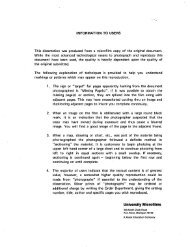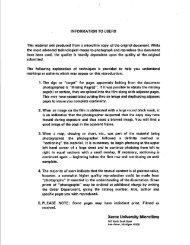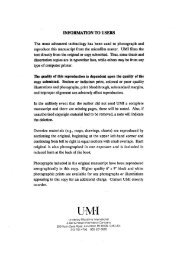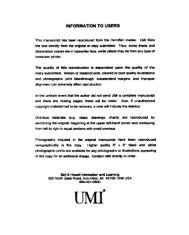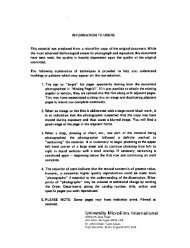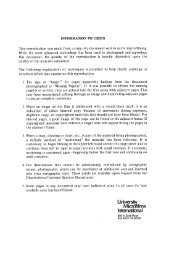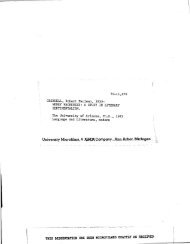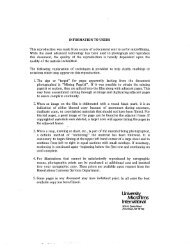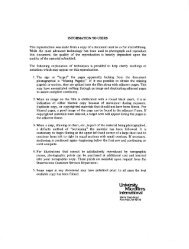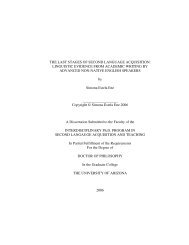- Page 1: INFORMATION TO USERS This nuinuscri
- Page 4 and 5: DMI Number: 9720712 Copyright 1996
- Page 6 and 7: STATEMENT BY AUTHOR This dissertati
- Page 8 and 9: ABSTRACT Michel Eyquem de Montaigne
- Page 10 and 11: INTRODUCTIOH The tem Essais evokes
- Page 12 and 13: Montaigne intended to sketch a comp
- Page 14 and 15: science, in regard to the sources o
- Page 16 and 17: are a philosophical-' rhetorical ef
- Page 18 and 19: the Church of Rome, the fulfillment
- Page 20 and 21: extension of language (Strange, 199
- Page 22 and 23: principle Montaigne when he says he
- Page 24 and 25: of political and economic control,
- Page 26 and 27: p. 39). The theme of illness and me
- Page 28 and 29: language such as clothing, games, a
- Page 30 and 31: coTiunentaries, to simplify the law
- Page 32 and 33: provincial law from the second cent
- Page 34 and 35: Francis Hotraan, who was to publish
- Page 38 and 39: which recognized that the sovereign
- Page 40 and 41: jurisprudence. Montai ,Tie asks his
- Page 42 and 43: The interior is disguised by an ext
- Page 44 and 45: to be monarch of both the church an
- Page 46 and 47: he becomes a symbol of an antagonis
- Page 48 and 49: abstract of humanistic, legal and s
- Page 50 and 51: Saint Thomas Aquinas expresses this
- Page 52 and 53: shall be as rottenness and their bl
- Page 54 and 55: to practical reason, not as regards
- Page 56 and 57: (p. 144 ff.) Each is able to find s
- Page 58 and 59: judgments about human acts (Aquinas
- Page 60 and 61: approximate principle of stability,
- Page 62 and 63: the situation as se tenir chancelan
- Page 64 and 65: were directly known, and Montaigne'
- Page 66 and 67: mediator between the King of France
- Page 68 and 69: human condition would be proud. The
- Page 70 and 71: Montaigne says he remembers in gene
- Page 72 and 73: cartographic traditions, assimilate
- Page 74 and 75: philosophy, which requires metaphor
- Page 76 and 77: knight said it had given him courag
- Page 78 and 79: There was a single figure at the bo
- Page 80 and 81: Paradoxa juris has humanistic comme
- Page 82 and 83: For the tribunals the texts of the
- Page 84 and 85: and gave it its full effect (p. 187
- Page 86 and 87:
must be conformed to the "existing
- Page 88 and 89:
government. Philosophers and jurist
- Page 90 and 91:
for Socrates, and ethical systems h
- Page 92 and 93:
city state, enclosed in walls and s
- Page 94 and 95:
systematization, the basis of the i
- Page 96 and 97:
certain matters. Erasmus said he co
- Page 98 and 99:
ules of games, and two ethical dial
- Page 100 and 101:
elated to the loose rhapsodic struc
- Page 102 and 103:
Ce sont les exigences du jugement l
- Page 104 and 105:
under another safeguard than theirs
- Page 106 and 107:
103 (1572-1580). This dissertation
- Page 108 and 109:
105 Ages and included the sixteenth
- Page 110 and 111:
107 beliefs and reputable opinions)
- Page 112 and 113:
109 both points of view in a litiga
- Page 114 and 115:
Ill of texts as well as of commonly
- Page 116 and 117:
mention only the author and the wor
- Page 118 and 119:
115 questions are inquiry, and Maso
- Page 120 and 121:
117 he has recorded, more surely an
- Page 122 and 123:
119 learning to Christianity (in th
- Page 124 and 125:
121 could be taken from the Topics
- Page 126 and 127:
123 As Cicero, he believed the purs
- Page 128 and 129:
of the ages, sheds light upon reali
- Page 130 and 131:
127 imitation. Mimesis is a dramati
- Page 132 and 133:
129 It is far from Aristotle himsel
- Page 134 and 135:
131 to have compassion on them. His
- Page 136 and 137:
133 process of incarnating God in a
- Page 138 and 139:
135 always some dislocation. He pre
- Page 140 and 141:
137 La Boetie is a pretext for Mont
- Page 142 and 143:
139 It means a mutation, and is emp
- Page 144 and 145:
nous tenons en nostre siecle que. .
- Page 146 and 147:
toujours la matiere: souvent ils la
- Page 148 and 149:
145 etc. When Montaigne speaks of h
- Page 150 and 151:
147 seventeenth century may refer t
- Page 152 and 153:
149 for itself (p. 724). It was the
- Page 154 and 155:
151 nature. Sanches sought more pre
- Page 156 and 157:
153 Things are enmattered. Uncondit
- Page 158 and 159:
155 offend him. One should listen t
- Page 160 and 161:
viendront apres raoi; car n'etre ne
- Page 162 and 163:
V. SOME INTERTEXTS 159 Montaigne's
- Page 164 and 165:
161 Joyeuse, a favorite of Henri II
- Page 166 and 167:
163 existence or form of society as
- Page 168 and 169:
considered himself head of the Byza
- Page 170 and 171:
There is a proverb: Homme plaideur,
- Page 172 and 173:
169 search for truth based upon the
- Page 174 and 175:
171 Castro believed in the immobili
- Page 176 and 177:
173 hidden in the texts. The writer
- Page 178 and 179:
175 Protestants, when the spirit of
- Page 180 and 181:
171 Letters in the service of a com
- Page 182 and 183:
179 the magistrate, takes on the co
- Page 184 and 185:
181 pretended to wish what they cou
- Page 186 and 187:
183 the Parliaments), Montaigne bel
- Page 188 and 189:
185 condemnation. He wondered how b
- Page 190 and 191:
n'est pas a dire, quand mon affecti
- Page 192 and 193:
a quoy nous convie la beaute des li
- Page 194 and 195:
191 exceptions. If the supreme auth
- Page 196 and 197:
193 moment, always decisive, but wh
- Page 198 and 199:
195 Joukovslcy says that modern cri
- Page 200 and 201:
197 was between reason and natural
- Page 202 and 203:
199 tradition of judging in equity,
- Page 204 and 205:
201 infallibility, but under that o
- Page 206 and 207:
203 It must be another case. It is
- Page 208 and 209:
205 authority is the foundation and
- Page 210 and 211:
207 that the assassins of Saint-Bar
- Page 212 and 213:
assembly would belong to a constitu
- Page 214 and 215:
legislator are not from their own a
- Page 216 and 217:
213 disassociated. Thus it remains
- Page 218 and 219:
215 Montaigne in the conclusion to
- Page 220 and 221:
217 apparent. The historical circum
- Page 222 and 223:
Augustine's City of God. 219 Gilber
- Page 224 and 225:
221 council of preudomes. and prefe
- Page 226 and 227:
223 taxation, and representation of
- Page 228 and 229:
225 many members of one body. They
- Page 230 and 231:
227 His criticism of the state of j
- Page 232 and 233:
profited, but some were exiled or e
- Page 234 and 235:
231 recognized extraordinary vocati
- Page 236 and 237:
233 metaphor used by Montaigne as w
- Page 238 and 239:
235 well as the rapport of governme
- Page 240 and 241:
237 the authority of the prince cam
- Page 242 and 243:
en son nom (p• 6). 239 This theor
- Page 244 and 245:
the Kings (Coviness, 1993, p. 729 f
- Page 246 and 247:
243 governs the people in conformit
- Page 248 and 249:
245 positive or human laws more ten
- Page 250 and 251:
247 law, and in regard to the gover
- Page 252 and 253:
249 however, considered coutume rat
- Page 254 and 255:
251 and there had been projects of
- Page 256 and 257:
253 Clemengis felt that so long as
- Page 258 and 259:
255 natural law, a priori principle
- Page 260 and 261:
VIII. FRANCO-GALLIA; RESISTANCE 257
- Page 262 and 263:
259 France to sell their properties
- Page 264 and 265:
261 a letter, which the Council of
- Page 266 and 267:
263 that private fantasies were dan
- Page 268 and 269:
them, when they were issued by the
- Page 270 and 271:
267 (Pasquier, 1966, p. 178 ff.) It
- Page 272 and 273:
p. 58) . 269 There are obviously tw
- Page 274 and 275:
271 of the Three Estates. It is a n
- Page 276 and 277:
que nos rois font, lorsqu'on leur m
- Page 278 and 279:
275 the idea of the deputies. It is
- Page 280 and 281:
277 King of France. That was very s
- Page 282 and 283:
279 and of making laws (p. 146). Th
- Page 284 and 285:
281 was not to publish either law o
- Page 286 and 287:
283 which were directed at the infr
- Page 288 and 289:
IX. SERVITUDE AND APOLOGIE 285 La B
- Page 290 and 291:
287 that beyond all his discourse a
- Page 292 and 293:
289 with maintaining the rule of th
- Page 294 and 295:
42) . 291 La Boetie seems more fami
- Page 296 and 297:
293 Human law is a dictate of pract
- Page 298 and 299:
295 God is in a creaturely manner.
- Page 300 and 301:
297 practical counsels destined for
- Page 302 and 303:
299 The Ecloaa set forth punishment
- Page 304 and 305:
301 Montaigne does not speak about
- Page 306 and 307:
303 64). (The Franciade of Ronsard
- Page 308 and 309:
305 invisible government of Provide
- Page 310 and 311:
307 forth a balance sheet to illust
- Page 312 and 313:
309 legislator. Plato believed that
- Page 314 and 315:
The principle of law is the common
- Page 316 and 317:
313 The question was extremely seri
- Page 318 and 319:
315 provoked resistance by rebellin
- Page 320 and 321:
317 Athens spent their time always
- Page 322 and 323:
to the possible succession at the t
- Page 324 and 325:
321 surprising, since Charles IX ha
- Page 326 and 327:
323 it eventually fell under siege
- Page 328 and 329:
325 Divine Word. He believes ambiti
- Page 330 and 331:
X. THE TROUBLES AND THE MEMOIRE 327
- Page 332 and 333:
329 the knowledge, honor and adorat
- Page 334 and 335:
331 Of cult are made in good faith.
- Page 336 and 337:
333 The Edict of July 31, 1561, a l
- Page 338 and 339:
335 peace to combat the Protestants
- Page 340 and 341:
337 whom Pasquier says they morts a
- Page 342 and 343:
339 but not even the Estates of the
- Page 344 and 345:
341 three votes. The resolution was
- Page 346 and 347:
343 Savoy. The Queen Mother, the Ki
- Page 348 and 349:
Pasquier as well. 345 In the confus
- Page 350 and 351:
the authority of Christ, to be impo
- Page 352 and 353:
349 Protecteur de l^Eqlise et ^ I'h
- Page 354 and 355:
351 than elsewhere, might spread to
- Page 356 and 357:
353 For La Boetie, the ultimate sol
- Page 358 and 359:
355 practices of the cult and of de
- Page 360 and 361:
357 Other virtues, since its action
- Page 362 and 363:
359 ritualized, as Montaigne descri
- Page 364 and 365:
361 public peace and rebellion agai
- Page 366 and 367:
363 knowledge of God must be indefi
- Page 368 and 369:
365 Theologians of the Middle Ages
- Page 370 and 371:
(Caracciolo, 1968, p. 482)." 367 Th
- Page 372 and 373:
369 technological means of control.
- Page 374 and 375:
371 recognition of free wills withi
- Page 376 and 377:
373 France. La Boetie did not belie
- Page 378 and 379:
375 several remonstrances before ve
- Page 380 and 381:
XI. LOI AND JUSTICE Ill The immedia
- Page 382 and 383:
379 act of judging. In ancient time
- Page 384 and 385:
381 argtunent is from the point of
- Page 386 and 387:
383 rendered in local courts. It al
- Page 388 and 389:
385 officers, who in last resort wo
- Page 390 and 391:
387 structure. Montaigne notes that
- Page 392 and 393:
389 to Change the government, but d
- Page 394 and 395:
391 Some were examined only about t
- Page 396 and 397:
393 the Chateau of Montaigne, and h
- Page 398 and 399:
395 great persons or the qentilshom
- Page 400 and 401:
397 offense. Some judges did have m
- Page 402 and 403:
399 all the concepts about such jus
- Page 404 and 405:
CONCLUSION 401 Montaigne based the
- Page 406 and 407:
403 statements are particular enoug
- Page 408 and 409:
405 Jesuits were founded by Saint I
- Page 410 and 411:
407 supports faith. It may also giv
- Page 412 and 413:
409 in opposition to family, fellow
- Page 414 and 415:
411 to an origin by Divine Providen
- Page 416 and 417:
significations. 413 6. The question
- Page 418 and 419:
415 Fifty-thousand men were slaught
- Page 420 and 421:
417 12. There was a great deal of c
- Page 422 and 423:
1994, pp. 173-174). 419 16. The Ess
- Page 424 and 425:
Of anaphora, syncope and alliterati
- Page 426 and 427:
423 Utterances, like the books of c
- Page 428 and 429:
425 receive letters, gifts and visi
- Page 430 and 431:
427 the street, no matter what thei
- Page 432 and 433:
429 Christmas creche had existed th
- Page 434 and 435:
431 ordinary gentlemen of the King.
- Page 436 and 437:
433 38. Jean Bodin's Republique inf
- Page 438 and 439:
435 published the French sonnets in
- Page 440 and 441:
437 Protestantism, at age twenty-se
- Page 442 and 443:
439 Ronsard says in the preface to
- Page 444 and 445:
441 After 1572 French tracts by Pro
- Page 446 and 447:
443 to England from the new edition
- Page 448 and 449:
445 made Affairs of state a habit,
- Page 450 and 451:
447 The doctors told him it was his
- Page 452 and 453:
it amusing (Pasquier, 1961, p. 62).
- Page 454 and 455:
451 taken, as well as Toulouse. In
- Page 456 and 457:
453 58. Saint John taught Saint Pol
- Page 458 and 459:
Benziger Brothers, Inc., 1947. Armi
- Page 460 and 461:
Editions Slatkine, 1983. Boon, Jean
- Page 462 and 463:
varietate stupendes. Princeton; Pri
- Page 464 and 465:
461 review by Robeirt Levine. Specu
- Page 466 and 467:
1975 (avril-septembre), pp. 65-74.
- Page 468 and 469:
1967, pp. 581-611. 465 , "The Monar
- Page 470 and 471:
Kelly, J. M. Roman Litigation. Oxfo
- Page 472 and 473:
Doubleday, 1964. Machiavelli, Nicco
- Page 474 and 475:
Scholarship & Opinion. Vol. 29, No.
- Page 476 and 477:
Geneve: Librairie Droz: 1966. 473 ,
- Page 478 and 479:
475 Semiotics." American Journal of
- Page 480 and 481:
XXIX, 1967, PP. 93-119. Smith, p. M
- Page 482 and 483:
479 R6gionales. Vol. I. Universite



